Social Work Resume Examples

Mar 31, 2025
|
12 min read
Unlock career opportunities with this social work resume guide that shows you how to showcase your skills with compassion. Find the fine line between helping and selling yourself, ensuring you stand out in the social services field.
Rated by 348 people
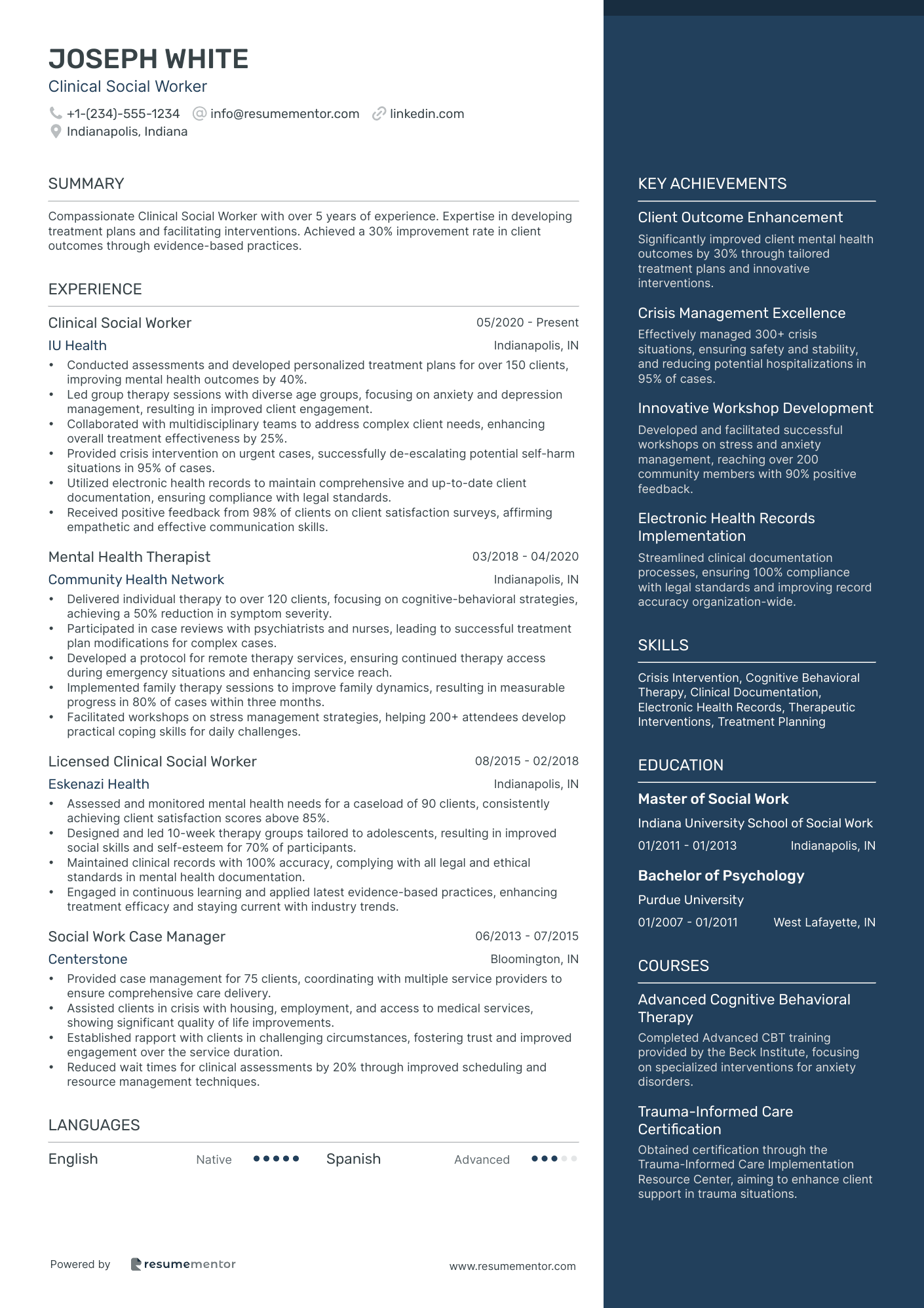
Clinical Social Worker
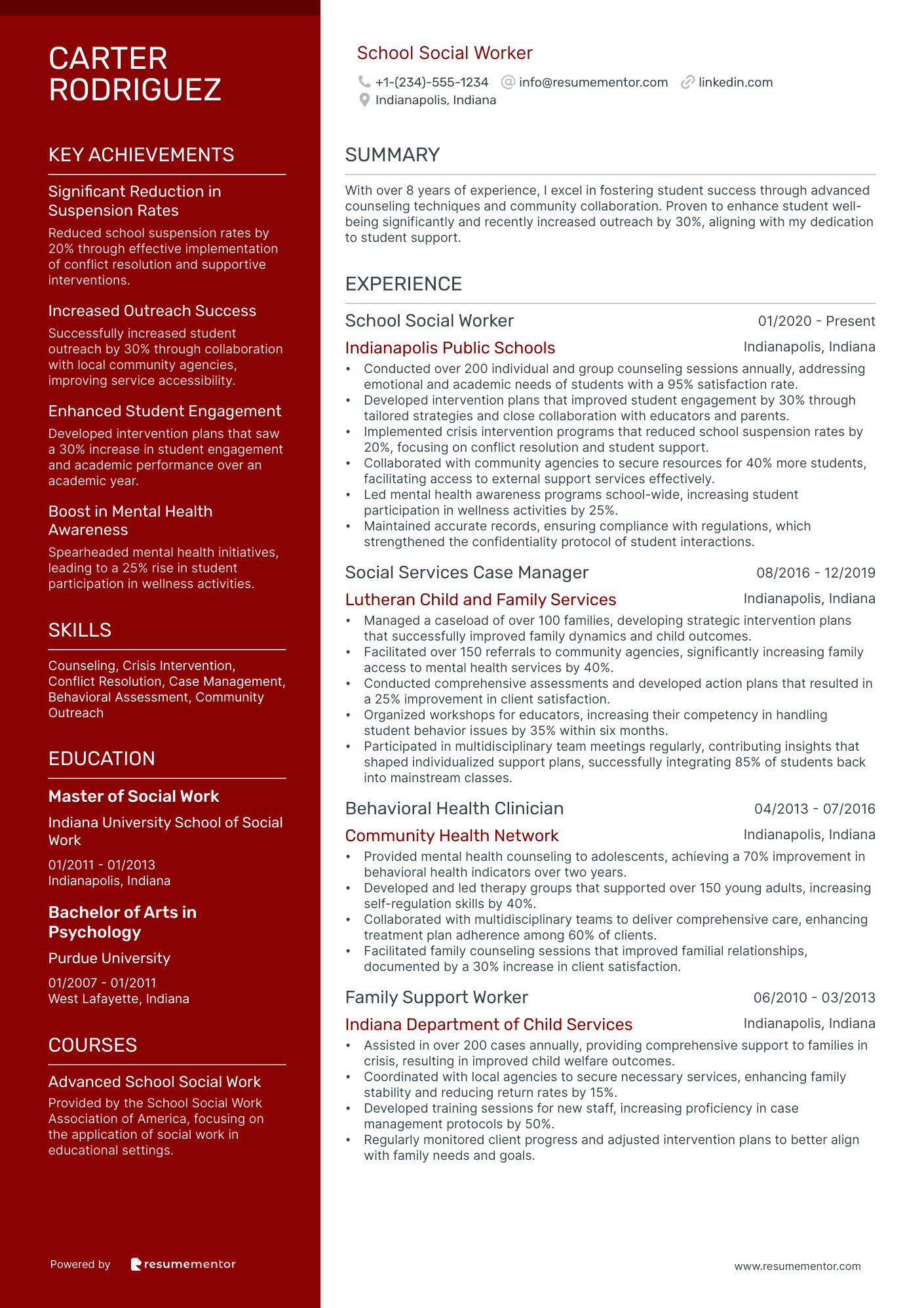
School Social Worker
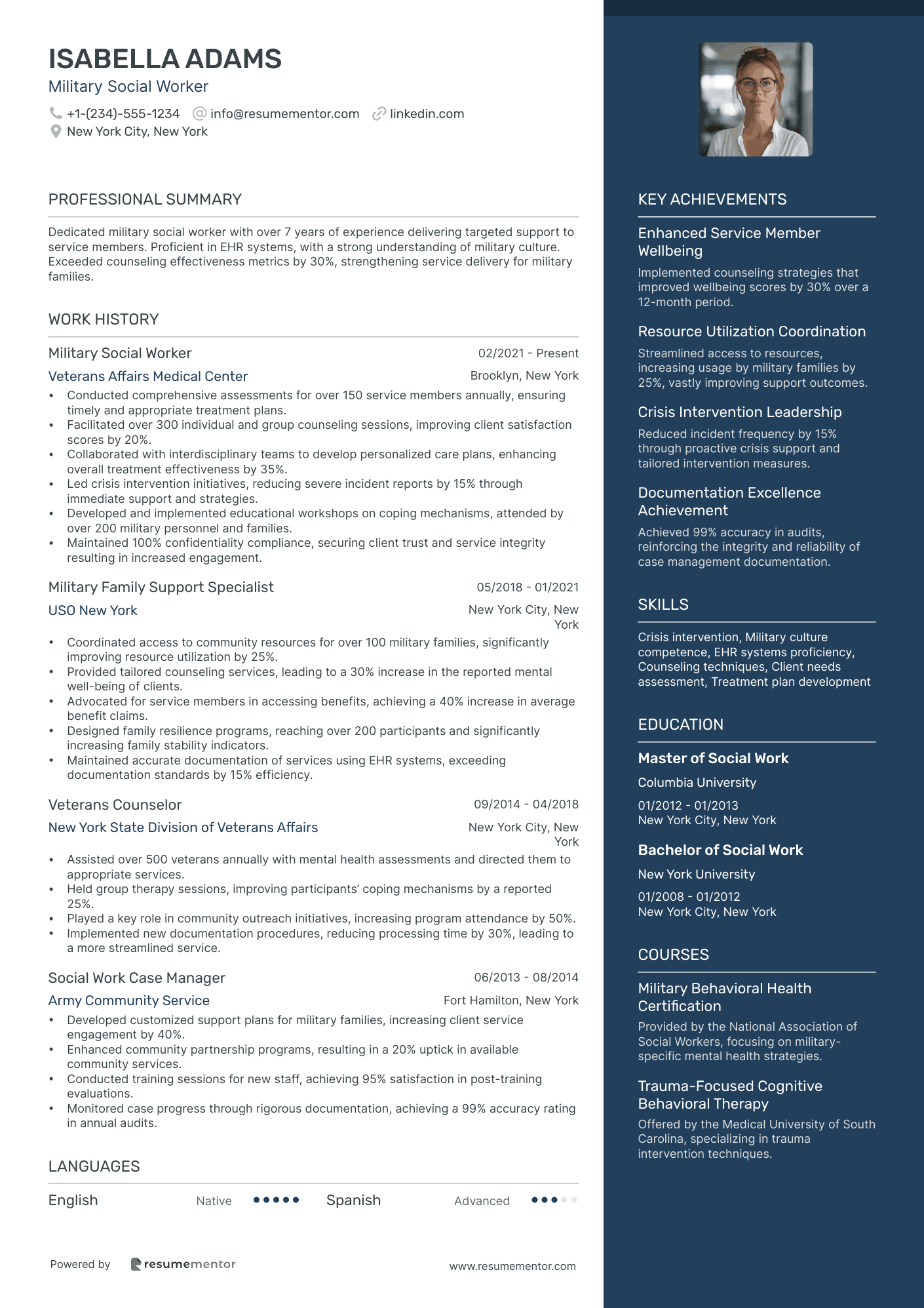
Military Social Worker
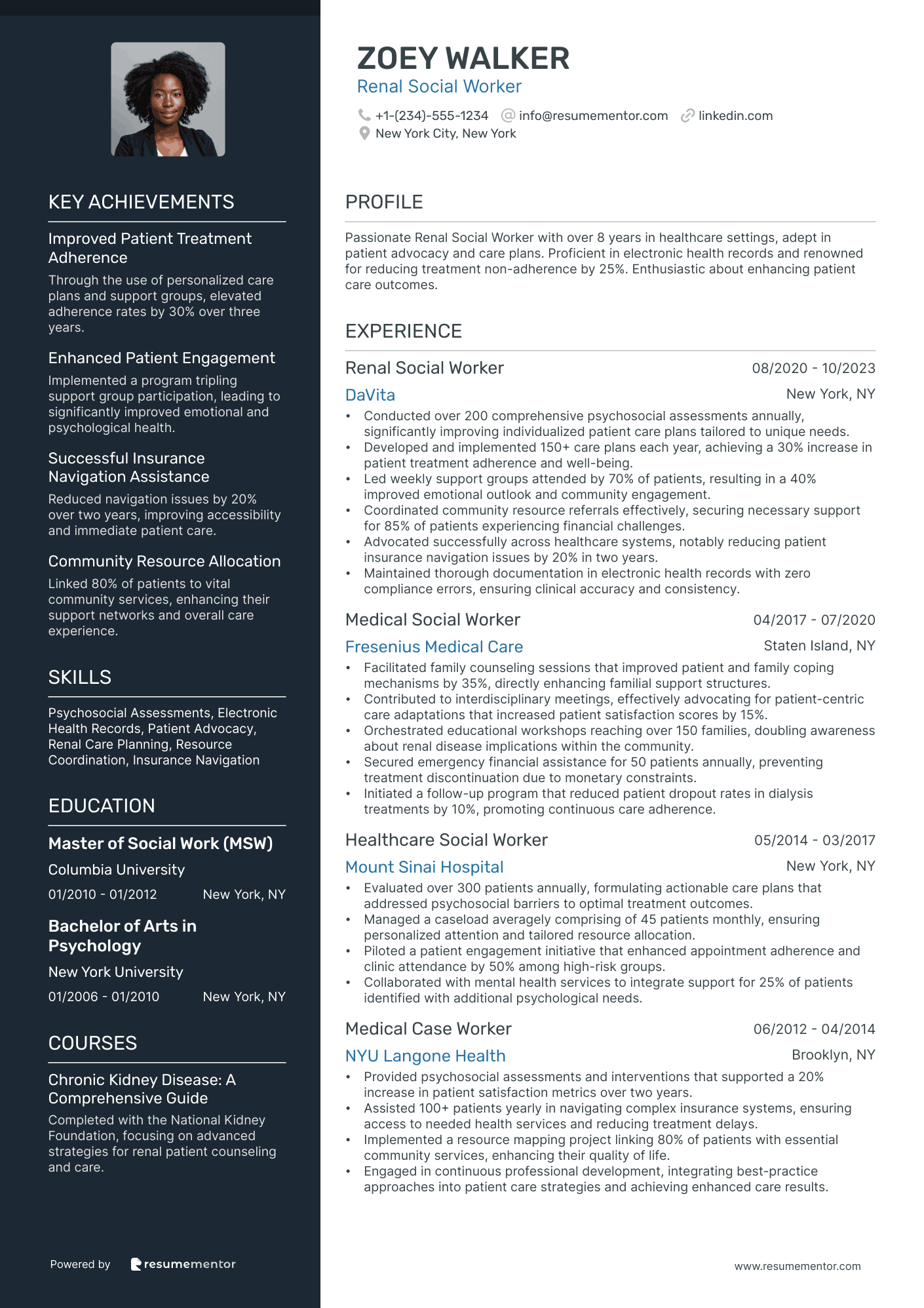
Renal Social Worker
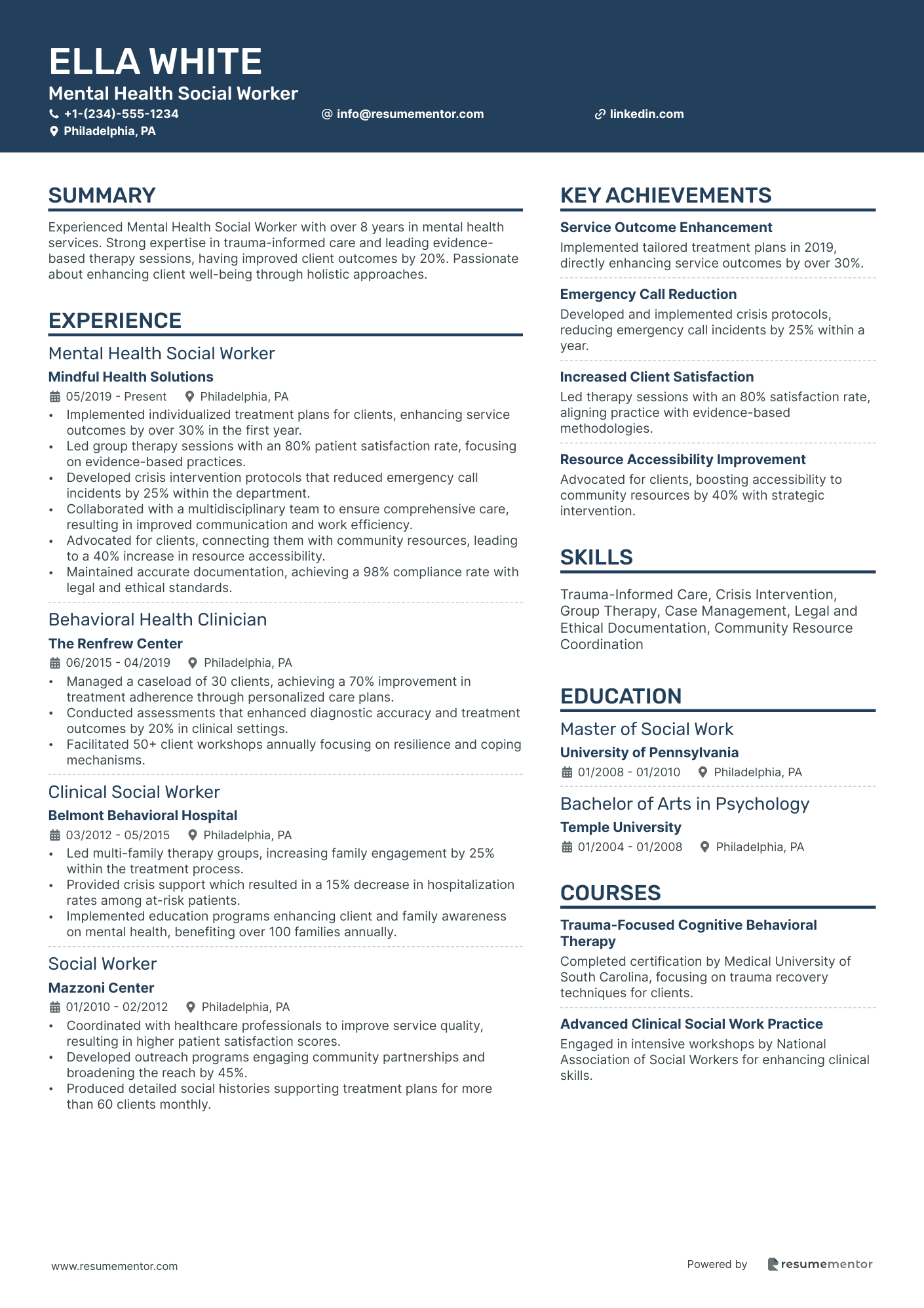
Mental Health Social Worker
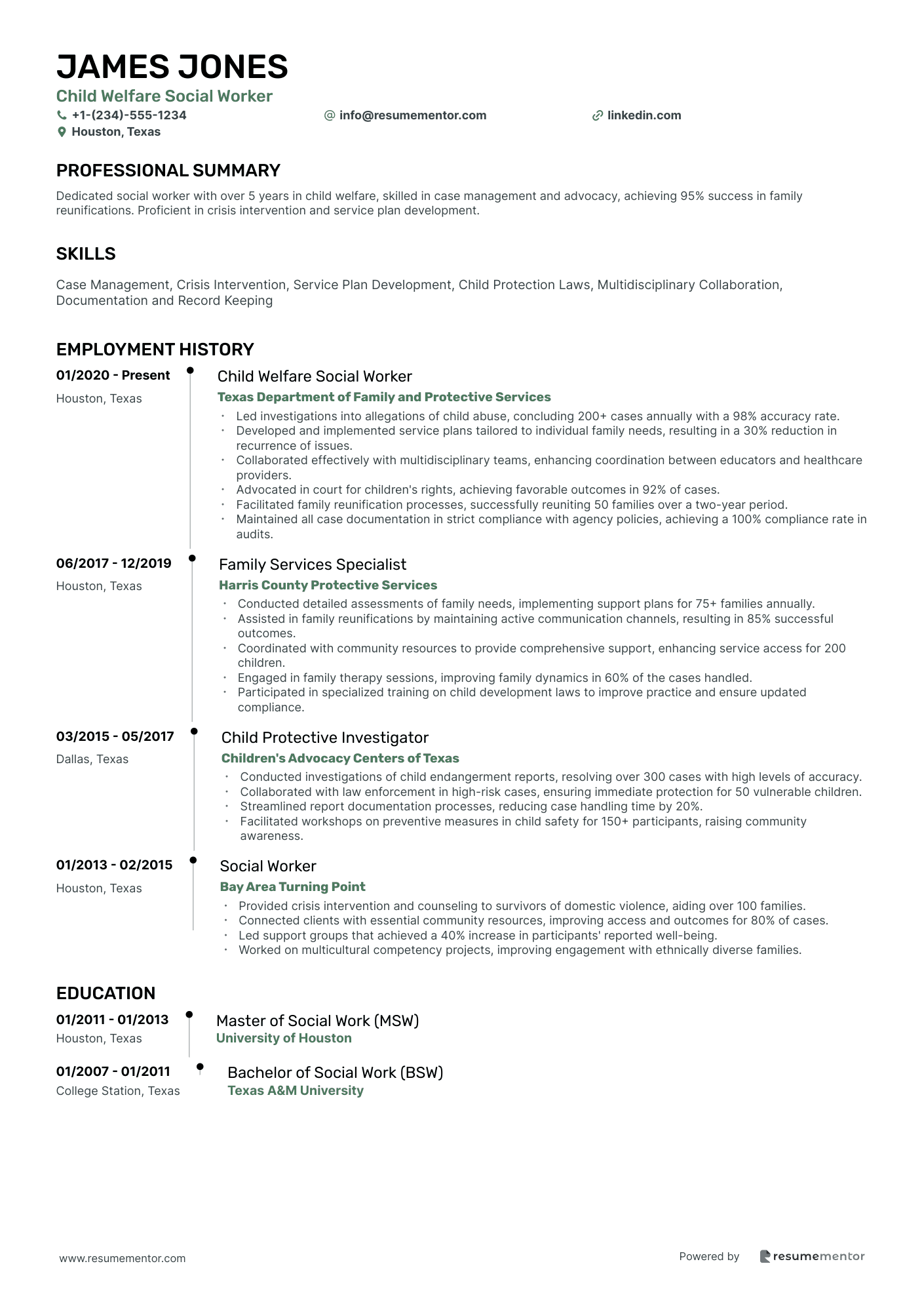
Child Welfare Social Worker
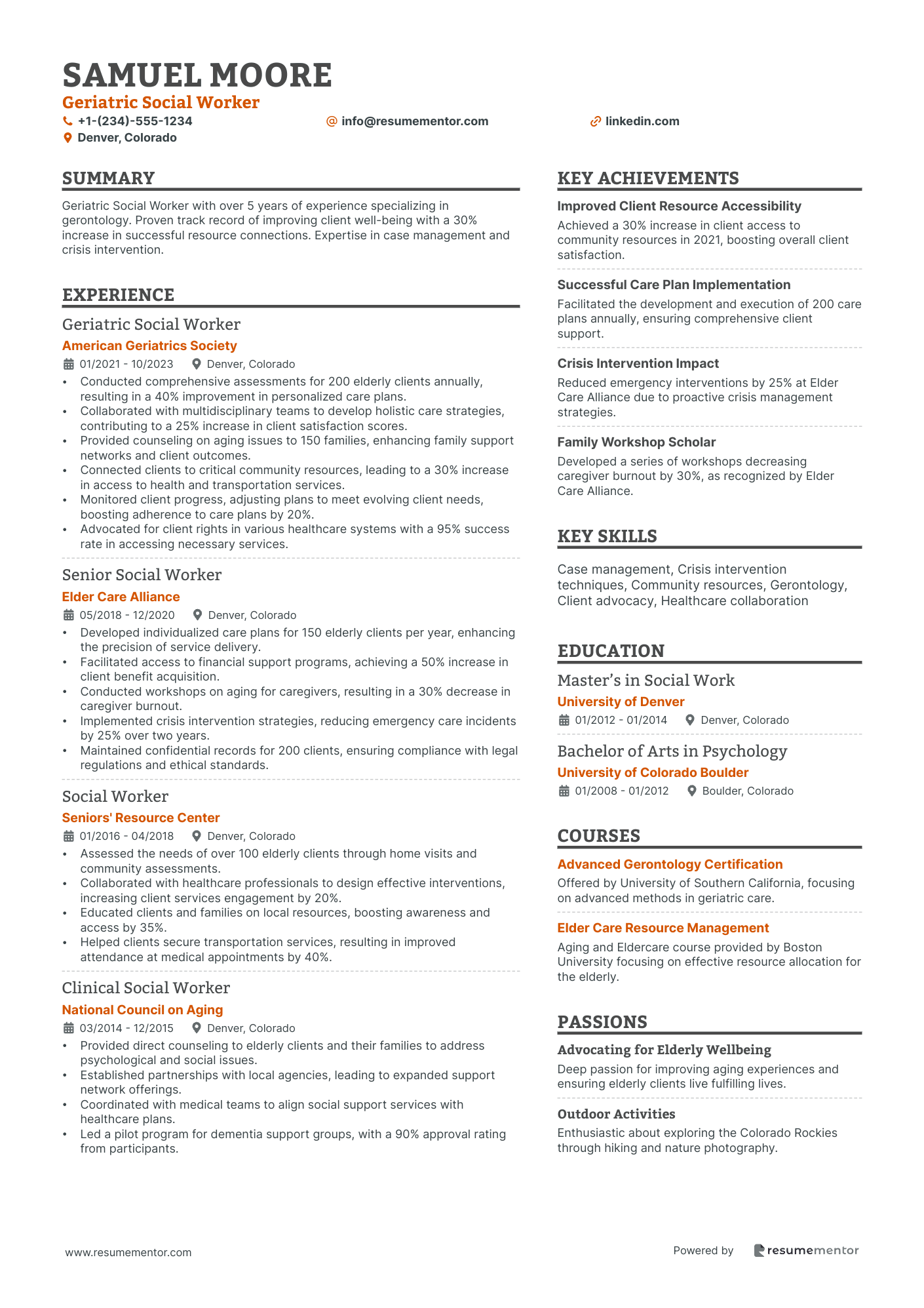
Geriatric Social Worker
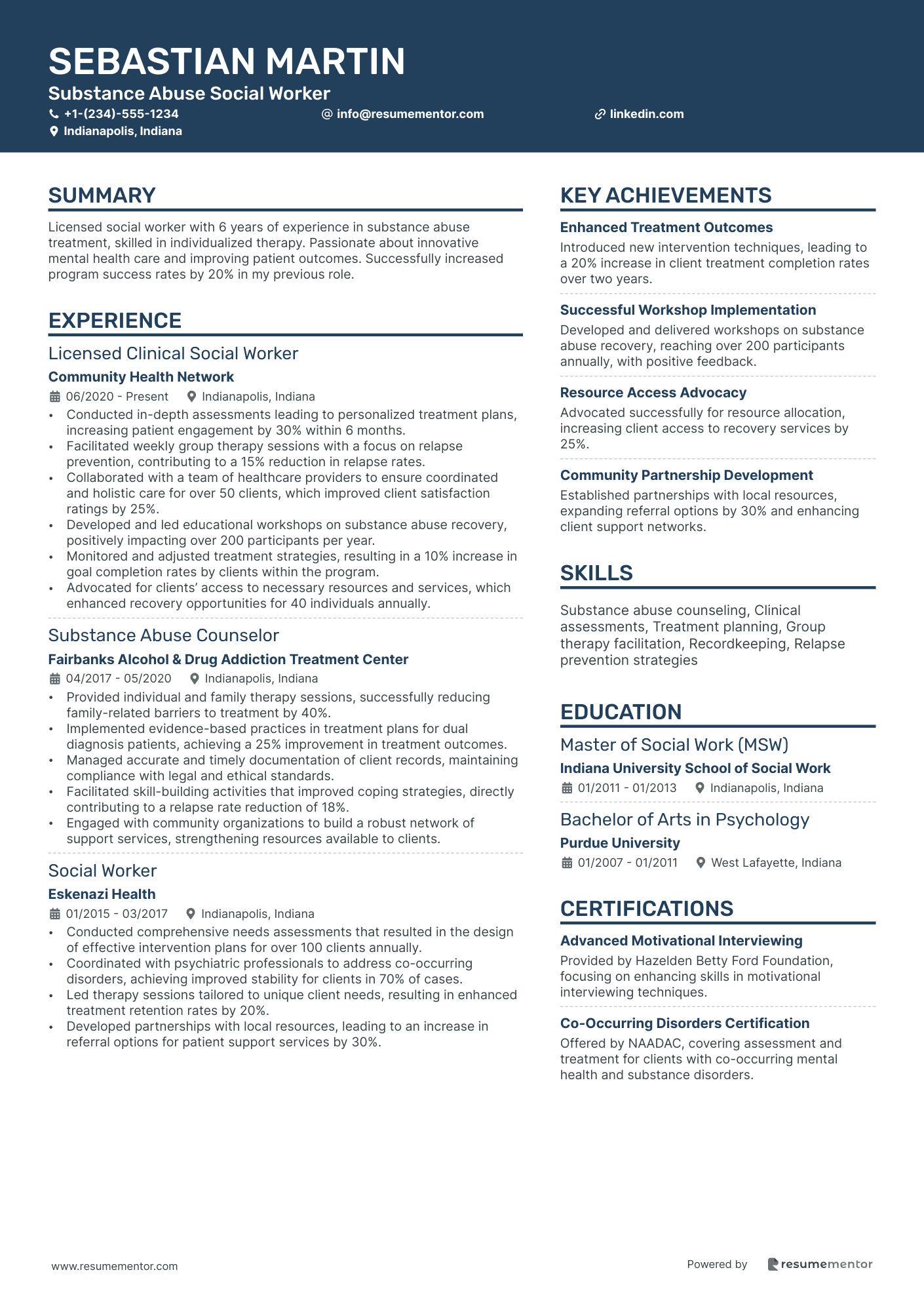
Substance Abuse Social Worker
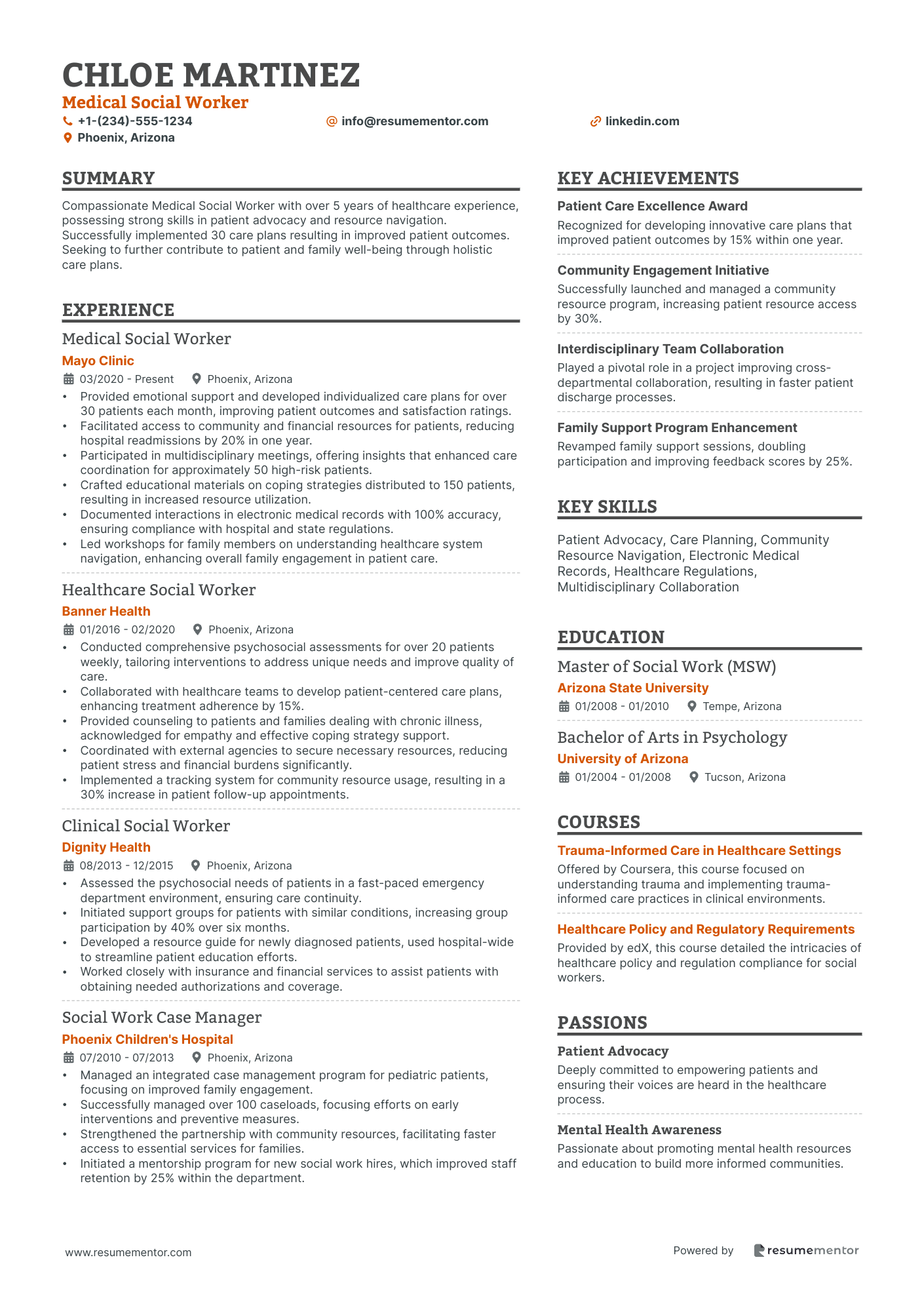
Medical Social Worker
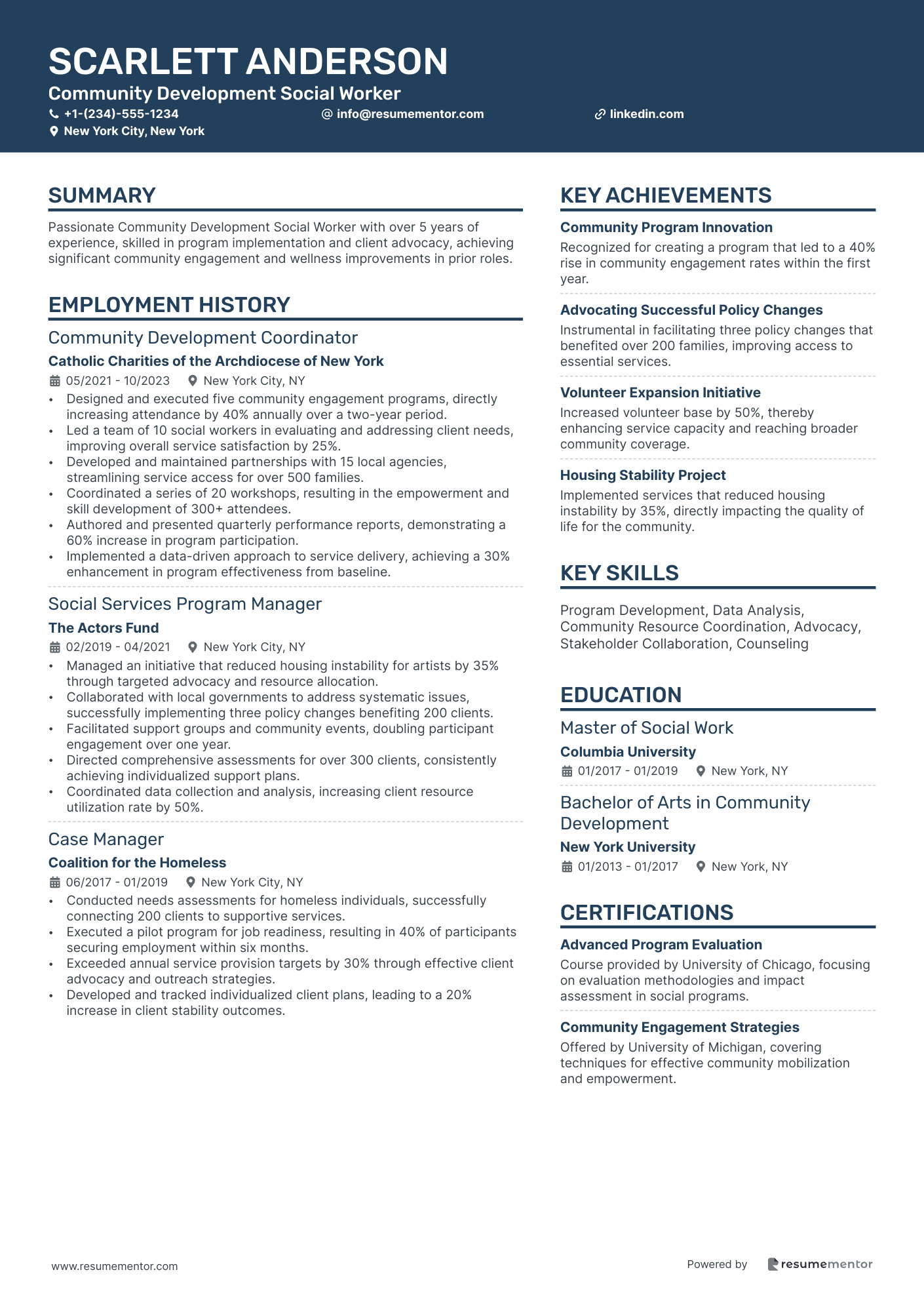
Community Development Social Worker

Clinical Social Worker resume sample
- •Conducted assessments and developed personalized treatment plans for over 150 clients, improving mental health outcomes by 40%.
- •Led group therapy sessions with diverse age groups, focusing on anxiety and depression management, resulting in improved client engagement.
- •Collaborated with multidisciplinary teams to address complex client needs, enhancing overall treatment effectiveness by 25%.
- •Provided crisis intervention on urgent cases, successfully de-escalating potential self-harm situations in 95% of cases.
- •Utilized electronic health records to maintain comprehensive and up-to-date client documentation, ensuring compliance with legal standards.
- •Received positive feedback from 98% of clients on client satisfaction surveys, affirming empathetic and effective communication skills.
- •Delivered individual therapy to over 120 clients, focusing on cognitive-behavioral strategies, achieving a 50% reduction in symptom severity.
- •Participated in case reviews with psychiatrists and nurses, leading to successful treatment plan modifications for complex cases.
- •Developed a protocol for remote therapy services, ensuring continued therapy access during emergency situations and enhancing service reach.
- •Implemented family therapy sessions to improve family dynamics, resulting in measurable progress in 80% of cases within three months.
- •Facilitated workshops on stress management strategies, helping 200+ attendees develop practical coping skills for daily challenges.
- •Assessed and monitored mental health needs for a caseload of 90 clients, consistently achieving client satisfaction scores above 85%.
- •Designed and led 10-week therapy groups tailored to adolescents, resulting in improved social skills and self-esteem for 70% of participants.
- •Maintained clinical records with 100% accuracy, complying with all legal and ethical standards in mental health documentation.
- •Engaged in continuous learning and applied latest evidence-based practices, enhancing treatment efficacy and staying current with industry trends.
- •Provided case management for 75 clients, coordinating with multiple service providers to ensure comprehensive care delivery.
- •Assisted clients in crisis with housing, employment, and access to medical services, showing significant quality of life improvements.
- •Established rapport with clients in challenging circumstances, fostering trust and improved engagement over the service duration.
- •Reduced wait times for clinical assessments by 20% through improved scheduling and resource management techniques.
School Social Worker resume sample
- •Conducted over 200 individual and group counseling sessions annually, addressing emotional and academic needs of students with a 95% satisfaction rate.
- •Developed intervention plans that improved student engagement by 30% through tailored strategies and close collaboration with educators and parents.
- •Implemented crisis intervention programs that reduced school suspension rates by 20%, focusing on conflict resolution and student support.
- •Collaborated with community agencies to secure resources for 40% more students, facilitating access to external support services effectively.
- •Led mental health awareness programs school-wide, increasing student participation in wellness activities by 25%.
- •Maintained accurate records, ensuring compliance with regulations, which strengthened the confidentiality protocol of student interactions.
- •Managed a caseload of over 100 families, developing strategic intervention plans that successfully improved family dynamics and child outcomes.
- •Facilitated over 150 referrals to community agencies, significantly increasing family access to mental health services by 40%.
- •Conducted comprehensive assessments and developed action plans that resulted in a 25% improvement in client satisfaction.
- •Organized workshops for educators, increasing their competency in handling student behavior issues by 35% within six months.
- •Participated in multidisciplinary team meetings regularly, contributing insights that shaped individualized support plans, successfully integrating 85% of students back into mainstream classes.
- •Provided mental health counseling to adolescents, achieving a 70% improvement in behavioral health indicators over two years.
- •Developed and led therapy groups that supported over 150 young adults, increasing self-regulation skills by 40%.
- •Collaborated with multidisciplinary teams to deliver comprehensive care, enhancing treatment plan adherence among 60% of clients.
- •Facilitated family counseling sessions that improved familial relationships, documented by a 30% increase in client satisfaction.
- •Assisted in over 200 cases annually, providing comprehensive support to families in crisis, resulting in improved child welfare outcomes.
- •Coordinated with local agencies to secure necessary services, enhancing family stability and reducing return rates by 15%.
- •Developed training sessions for new staff, increasing proficiency in case management protocols by 50%.
- •Regularly monitored client progress and adjusted intervention plans to better align with family needs and goals.
Military Social Worker resume sample
- •Conducted comprehensive assessments for over 150 service members annually, ensuring timely and appropriate treatment plans.
- •Facilitated over 300 individual and group counseling sessions, improving client satisfaction scores by 20%.
- •Collaborated with interdisciplinary teams to develop personalized care plans, enhancing overall treatment effectiveness by 35%.
- •Led crisis intervention initiatives, reducing severe incident reports by 15% through immediate support and strategies.
- •Developed and implemented educational workshops on coping mechanisms, attended by over 200 military personnel and families.
- •Maintained 100% confidentiality compliance, securing client trust and service integrity resulting in increased engagement.
- •Coordinated access to community resources for over 100 military families, significantly improving resource utilization by 25%.
- •Provided tailored counseling services, leading to a 30% increase in the reported mental well-being of clients.
- •Advocated for service members in accessing benefits, achieving a 40% increase in average benefit claims.
- •Designed family resilience programs, reaching over 200 participants and significantly increasing family stability indicators.
- •Maintained accurate documentation of services using EHR systems, exceeding documentation standards by 15% efficiency.
- •Assisted over 500 veterans annually with mental health assessments and directed them to appropriate services.
- •Held group therapy sessions, improving participants’ coping mechanisms by a reported 25%.
- •Played a key role in community outreach initiatives, increasing program attendance by 50%.
- •Implemented new documentation procedures, reducing processing time by 30%, leading to a more streamlined service.
- •Developed customized support plans for military families, increasing client service engagement by 40%.
- •Enhanced community partnership programs, resulting in a 20% uptick in available community services.
- •Conducted training sessions for new staff, achieving 95% satisfaction in post-training evaluations.
- •Monitored case progress through rigorous documentation, achieving a 99% accuracy rating in annual audits.
Renal Social Worker resume sample
- •Conducted over 200 comprehensive psychosocial assessments annually, significantly improving individualized patient care plans tailored to unique needs.
- •Developed and implemented 150+ care plans each year, achieving a 30% increase in patient treatment adherence and well-being.
- •Led weekly support groups attended by 70% of patients, resulting in a 40% improved emotional outlook and community engagement.
- •Coordinated community resource referrals effectively, securing necessary support for 85% of patients experiencing financial challenges.
- •Advocated successfully across healthcare systems, notably reducing patient insurance navigation issues by 20% in two years.
- •Maintained thorough documentation in electronic health records with zero compliance errors, ensuring clinical accuracy and consistency.
- •Facilitated family counseling sessions that improved patient and family coping mechanisms by 35%, directly enhancing familial support structures.
- •Contributed to interdisciplinary meetings, effectively advocating for patient-centric care adaptations that increased patient satisfaction scores by 15%.
- •Orchestrated educational workshops reaching over 150 families, doubling awareness about renal disease implications within the community.
- •Secured emergency financial assistance for 50 patients annually, preventing treatment discontinuation due to monetary constraints.
- •Initiated a follow-up program that reduced patient dropout rates in dialysis treatments by 10%, promoting continuous care adherence.
- •Evaluated over 300 patients annually, formulating actionable care plans that addressed psychosocial barriers to optimal treatment outcomes.
- •Managed a caseload averagely comprising of 45 patients monthly, ensuring personalized attention and tailored resource allocation.
- •Piloted a patient engagement initiative that enhanced appointment adherence and clinic attendance by 50% among high-risk groups.
- •Collaborated with mental health services to integrate support for 25% of patients identified with additional psychological needs.
- •Provided psychosocial assessments and interventions that supported a 20% increase in patient satisfaction metrics over two years.
- •Assisted 100+ patients yearly in navigating complex insurance systems, ensuring access to needed health services and reducing treatment delays.
- •Implemented a resource mapping project linking 80% of patients with essential community services, enhancing their quality of life.
- •Engaged in continuous professional development, integrating best-practice approaches into patient care strategies and achieving enhanced care results.
Mental Health Social Worker resume sample
- •Implemented individualized treatment plans for clients, enhancing service outcomes by over 30% in the first year.
- •Led group therapy sessions with an 80% patient satisfaction rate, focusing on evidence-based practices.
- •Developed crisis intervention protocols that reduced emergency call incidents by 25% within the department.
- •Collaborated with a multidisciplinary team to ensure comprehensive care, resulting in improved communication and work efficiency.
- •Advocated for clients, connecting them with community resources, leading to a 40% increase in resource accessibility.
- •Maintained accurate documentation, achieving a 98% compliance rate with legal and ethical standards.
- •Managed a caseload of 30 clients, achieving a 70% improvement in treatment adherence through personalized care plans.
- •Conducted assessments that enhanced diagnostic accuracy and treatment outcomes by 20% in clinical settings.
- •Facilitated 50+ client workshops annually focusing on resilience and coping mechanisms.
- •Led multi-family therapy groups, increasing family engagement by 25% within the treatment process.
- •Provided crisis support which resulted in a 15% decrease in hospitalization rates among at-risk patients.
- •Implemented education programs enhancing client and family awareness on mental health, benefiting over 100 families annually.
- •Coordinated with healthcare professionals to improve service quality, resulting in higher patient satisfaction scores.
- •Developed outreach programs engaging community partnerships and broadening the reach by 45%.
- •Produced detailed social histories supporting treatment plans for more than 60 clients monthly.
Child Welfare Social Worker resume sample
- •Led investigations into allegations of child abuse, concluding 200+ cases annually with a 98% accuracy rate.
- •Developed and implemented service plans tailored to individual family needs, resulting in a 30% reduction in recurrence of issues.
- •Collaborated effectively with multidisciplinary teams, enhancing coordination between educators and healthcare providers.
- •Advocated in court for children's rights, achieving favorable outcomes in 92% of cases.
- •Facilitated family reunification processes, successfully reuniting 50 families over a two-year period.
- •Maintained all case documentation in strict compliance with agency policies, achieving a 100% compliance rate in audits.
- •Conducted detailed assessments of family needs, implementing support plans for 75+ families annually.
- •Assisted in family reunifications by maintaining active communication channels, resulting in 85% successful outcomes.
- •Coordinated with community resources to provide comprehensive support, enhancing service access for 200 children.
- •Engaged in family therapy sessions, improving family dynamics in 60% of the cases handled.
- •Participated in specialized training on child development laws to improve practice and ensure updated compliance.
- •Conducted investigations of child endangerment reports, resolving over 300 cases with high levels of accuracy.
- •Collaborated with law enforcement in high-risk cases, ensuring immediate protection for 50 vulnerable children.
- •Streamlined report documentation processes, reducing case handling time by 20%.
- •Facilitated workshops on preventive measures in child safety for 150+ participants, raising community awareness.
- •Provided crisis intervention and counseling to survivors of domestic violence, aiding over 100 families.
- •Connected clients with essential community resources, improving access and outcomes for 80% of cases.
- •Led support groups that achieved a 40% increase in participants' reported well-being.
- •Worked on multicultural competency projects, improving engagement with ethnically diverse families.
Geriatric Social Worker resume sample
- •Conducted comprehensive assessments for 200 elderly clients annually, resulting in a 40% improvement in personalized care plans.
- •Collaborated with multidisciplinary teams to develop holistic care strategies, contributing to a 25% increase in client satisfaction scores.
- •Provided counseling on aging issues to 150 families, enhancing family support networks and client outcomes.
- •Connected clients to critical community resources, leading to a 30% increase in access to health and transportation services.
- •Monitored client progress, adjusting plans to meet evolving client needs, boosting adherence to care plans by 20%.
- •Advocated for client rights in various healthcare systems with a 95% success rate in accessing necessary services.
- •Developed individualized care plans for 150 elderly clients per year, enhancing the precision of service delivery.
- •Facilitated access to financial support programs, achieving a 50% increase in client benefit acquisition.
- •Conducted workshops on aging for caregivers, resulting in a 30% decrease in caregiver burnout.
- •Implemented crisis intervention strategies, reducing emergency care incidents by 25% over two years.
- •Maintained confidential records for 200 clients, ensuring compliance with legal regulations and ethical standards.
- •Assessed the needs of over 100 elderly clients through home visits and community assessments.
- •Collaborated with healthcare professionals to design effective interventions, increasing client services engagement by 20%.
- •Educated clients and families on local resources, boosting awareness and access by 35%.
- •Helped clients secure transportation services, resulting in improved attendance at medical appointments by 40%.
- •Provided direct counseling to elderly clients and their families to address psychological and social issues.
- •Established partnerships with local agencies, leading to expanded support network offerings.
- •Coordinated with medical teams to align social support services with healthcare plans.
- •Led a pilot program for dementia support groups, with a 90% approval rating from participants.
Substance Abuse Social Worker resume sample
- •Conducted in-depth assessments leading to personalized treatment plans, increasing patient engagement by 30% within 6 months.
- •Facilitated weekly group therapy sessions with a focus on relapse prevention, contributing to a 15% reduction in relapse rates.
- •Collaborated with a team of healthcare providers to ensure coordinated and holistic care for over 50 clients, which improved client satisfaction ratings by 25%.
- •Developed and led educational workshops on substance abuse recovery, positively impacting over 200 participants per year.
- •Monitored and adjusted treatment strategies, resulting in a 10% increase in goal completion rates by clients within the program.
- •Advocated for clients’ access to necessary resources and services, which enhanced recovery opportunities for 40 individuals annually.
- •Provided individual and family therapy sessions, successfully reducing family-related barriers to treatment by 40%.
- •Implemented evidence-based practices in treatment plans for dual diagnosis patients, achieving a 25% improvement in treatment outcomes.
- •Managed accurate and timely documentation of client records, maintaining compliance with legal and ethical standards.
- •Facilitated skill-building activities that improved coping strategies, directly contributing to a relapse rate reduction of 18%.
- •Engaged with community organizations to build a robust network of support services, strengthening resources available to clients.
- •Conducted comprehensive needs assessments that resulted in the design of effective intervention plans for over 100 clients annually.
- •Coordinated with psychiatric professionals to address co-occurring disorders, achieving improved stability for clients in 70% of cases.
- •Led therapy sessions tailored to unique client needs, resulting in enhanced treatment retention rates by 20%.
- •Developed partnerships with local resources, leading to an increase in referral options for patient support services by 30%.
- •Managed a caseload of 45 clients, ensuring individualized plans were effectively implemented, boosting program compliance by 35%.
- •Conducted outreach and advocacy that resulted in securing housing for 15 clients within an expedited timeframe.
- •Created comprehensive progress reports that improved care coordination and communication with multidisciplinary teams.
- •Organized support groups that increased community involvement, enhancing engagement in recovery programs.
Medical Social Worker resume sample
- •Provided emotional support and developed individualized care plans for over 30 patients each month, improving patient outcomes and satisfaction ratings.
- •Facilitated access to community and financial resources for patients, reducing hospital readmissions by 20% in one year.
- •Participated in multidisciplinary meetings, offering insights that enhanced care coordination for approximately 50 high-risk patients.
- •Crafted educational materials on coping strategies distributed to 150 patients, resulting in increased resource utilization.
- •Documented interactions in electronic medical records with 100% accuracy, ensuring compliance with hospital and state regulations.
- •Led workshops for family members on understanding healthcare system navigation, enhancing overall family engagement in patient care.
- •Conducted comprehensive psychosocial assessments for over 20 patients weekly, tailoring interventions to address unique needs and improve quality of care.
- •Collaborated with healthcare teams to develop patient-centered care plans, enhancing treatment adherence by 15%.
- •Provided counseling to patients and families dealing with chronic illness, acknowledged for empathy and effective coping strategy support.
- •Coordinated with external agencies to secure necessary resources, reducing patient stress and financial burdens significantly.
- •Implemented a tracking system for community resource usage, resulting in a 30% increase in patient follow-up appointments.
- •Assessed the psychosocial needs of patients in a fast-paced emergency department environment, ensuring care continuity.
- •Initiated support groups for patients with similar conditions, increasing group participation by 40% over six months.
- •Developed a resource guide for newly diagnosed patients, used hospital-wide to streamline patient education efforts.
- •Worked closely with insurance and financial services to assist patients with obtaining needed authorizations and coverage.
- •Managed an integrated case management program for pediatric patients, focusing on improved family engagement.
- •Successfully managed over 100 caseloads, focusing efforts on early interventions and preventive measures.
- •Strengthened the partnership with community resources, facilitating faster access to essential services for families.
- •Initiated a mentorship program for new social work hires, which improved staff retention by 25% within the department.
Community Development Social Worker resume sample
- •Designed and executed five community engagement programs, directly increasing attendance by 40% annually over a two-year period.
- •Led a team of 10 social workers in evaluating and addressing client needs, improving overall service satisfaction by 25%.
- •Developed and maintained partnerships with 15 local agencies, streamlining service access for over 500 families.
- •Coordinated a series of 20 workshops, resulting in the empowerment and skill development of 300+ attendees.
- •Authored and presented quarterly performance reports, demonstrating a 60% increase in program participation.
- •Implemented a data-driven approach to service delivery, achieving a 30% enhancement in program effectiveness from baseline.
- •Managed an initiative that reduced housing instability for artists by 35% through targeted advocacy and resource allocation.
- •Collaborated with local governments to address systematic issues, successfully implementing three policy changes benefiting 200 clients.
- •Facilitated support groups and community events, doubling participant engagement over one year.
- •Directed comprehensive assessments for over 300 clients, consistently achieving individualized support plans.
- •Coordinated data collection and analysis, increasing client resource utilization rate by 50%.
- •Conducted needs assessments for homeless individuals, successfully connecting 200 clients to supportive services.
- •Executed a pilot program for job readiness, resulting in 40% of participants securing employment within six months.
- •Exceeded annual service provision targets by 30% through effective client advocacy and outreach strategies.
- •Developed and tracked individualized client plans, leading to a 20% increase in client stability outcomes.
- •Successfully increased volunteer participation by 50% through targeted recruitment efforts and community partnerships.
- •Assisted in the design and implementation of a community food distribution program, serving over 1,000 families monthly.
- •Identified resource needs and facilitated access to services, decreasing unmet service requests by 40%.
- •Conducted training sessions for volunteers, improving service delivery efficiency by 25%.
As a social work professional, your resume is more than just a list of jobs—it's your story. In a field rooted in empathy and problem-solving, translating your real-world experience into words can feel like fitting a vast world into a small frame. Yet, this is key to conveying your diverse skills and dedication effectively.
To attract employers, your resume needs to showcase your blend of communication skills, therapeutic techniques, and case management experience. Capturing these elements clearly and concisely requires balancing professionalism with passion. This is where structuring becomes essential, ensuring that your varied skill set comes to life on the page.
Using a template can be your guiding map, helping you shape your story without getting overwhelmed by details. With a structured format, you can highlight advocacy work and demonstrate your skills in crisis intervention seamlessly. Resume templates provide a framework to present your narrative in a way that resonates.
This approach not only saves you time but also ensures your strengths shine through. Your mission as a social worker is to make an impact, and a well-structured resume can help you stand out to employers who value your unique skills and compassion. By organizing your resume with intent, you position yourself as the standout candidate your next employer is looking for.
Key Takeaways
- A resume in social work should effectively balance professionalism and personal passion, using templates to structure your narrative and highlight key skills like communication, case management, and crisis intervention.
- Each section of the resume should clearly present your contact information, a professional summary, work experience, education, skills, and any certifications/licenses, tailored to the job description to enhance alignment with potential employers.
- Choosing the right resume format—chronological for career growth or functional/combination for career changes—is crucial, along with using modern fonts and PDFs to ensure presentation consistency and readability.
- The experience section should use action verbs and quantify achievements to showcase your impact in the social work field, tailored to match job ads and capture the attention of hiring managers.
- Highlighting both hard skills (technical abilities) and soft skills (emotional and interpersonal skills) effectively showcases your comprehensive qualifications, making your resume appealing to both applicant tracking systems and hiring managers.
What to focus on when writing your social work resume
A social work resume should communicate your dedication to helping others while highlighting your expertise in providing supportive services. It's about showcasing your ability to build strong relationships, understand client needs, and create effective care plans. Equally important is demonstrating your knowledge of community resources and advocacy skills.
How to structure your social work resume
- Contact Information — Start with your full name, phone number, email address, and LinkedIn profile. These are your professional identifiers and are crucial for making it easy for recruiters to reach you. Ensuring that this information is current and easy to read is the first step in making a solid impression; it's the initial way to demonstrate your attention to detail and professionalism.
- Professional Summary — This brief opening paragraph captures your commitment to social work by summarizing key achievements and experiences. It should emphasize empathy and communication skills, and it sets the tone for your qualifications. Crafting a compelling professional summary can immediately grab the recruiter's attention and make them want to learn more about you.
- Work Experience — When listing previous roles, provide the organization name, job title, and employment dates. Focus on highlighting accomplishments that reflect your problem-solving and case management skills, painting a clear picture of your work history. Use active language to demonstrate how you made a difference in each role, which helps you stand out from other candidates.
- Education — Detail your degrees, institutions, and graduation dates. Mention relevant coursework or projects that have deepened your social work knowledge, linking your academic background with your practical experience. This section serves to build on the foundation you've created in the field and demonstrates ongoing commitment to learning.
- Skills — Focus on social work-specific abilities like crisis intervention, client assessment, and mental health practices. Customizing these skills to align with the job description ensures they resonate with the role you’re applying for. This section is key to exhibiting your versatility and readiness for the specific challenges of the job.
- Certifications and Licenses — Adding any social work licenses or certifications, such as a Licensed Clinical Social Worker (LCSW), establishes your professional competence and dedication to the field. This highlights your qualifications to potential employers and adds credibility to your application.
To further enrich your resume, consider adding optional sections like Volunteer Experience or Awards. These can be particularly impactful if they relate to community service or social justice efforts, providing a more comprehensive picture of your commitment to social work. With the basics covered, we will now go over each section more in-depth.
Which resume format to choose
Choosing the right format is a key step in writing your social work resume. A chronological format works well as it effectively showcases your career growth and stability. This format is particularly beneficial for highlighting your experience in various social work settings, painting a clear picture of your professional journey. However, if you have employment gaps or are entering social work from another field, you might opt for a functional or combination format. These alternatives allow you to highlight specific skills and accomplishments, which is crucial when shifting career paths or stepping back into the field.
For fonts, selecting the right one enhances readability and presentation. Consider using modern options like Raleway, Lato, or Chivo. These fonts are clean and professional, helping your resume stand apart without overwhelming the reader. They maintain aesthetic appeal while ensuring that those in hiring positions can easily focus on your pertinent skills and experiences. This selection supports your overall goal of presenting an engaging and organized document.
Saving your resume as a PDF is essential. PDFs maintain consistency in formatting, ensuring that your resume looks the same regardless of the device it's opened on. This filetype upholds your professionalism and guarantees that none of your carefully laid-out information is lost or misaligned, which is important when trying to make a strong first impression.
When setting your margins, one inch on all sides is ideal. This standard offers a clean, approachable layout that enhances readability. Adequate margins create an inviting space for recruiters to absorb your qualifications without distraction. A well-structured document that guides the eye naturally helps convey your qualifications effectively in a field where empathy and attention to detail are key.
Incorporating these tips on format, font, filetype, and margins will lead to a social work resume that effectively highlights your unique strengths and contributions to the field.
How to write a quantifiable resume experience section
Your social work resume experience section is a vital snapshot of your expertise, highlighting the meaningful impact you've made in your roles. It should start with the most recent positions first, in reverse chronological order, making it easy for employers to spot your most relevant work. Typically, cover the last 10 years or three roles unless earlier ones are essential.
Including job titles such as “Social Worker,” “Case Manager,” or “Clinical Social Worker” keeps the focus sharp. Tailor your resume by matching your experiences with specific job ads, using keywords to navigate applicant tracking systems and capture the hiring manager’s attention. Use strong action verbs like “facilitated,” “implemented,” “advocated,” and “collaborated” to emphasize accomplishments, offering a deeper insight into your contributions rather than listing duties.
Here's a well-crafted experience section that embodies this approach:
- •Facilitated over 200 successful client interventions, improving family dynamics.
- •Implemented support programs that increased community engagement by 30%.
- •Advocated for and secured $50,000 in funding for underprivileged youth initiatives.
- •Collaborated with local agencies to deliver workshops that doubled participation rates.
This section draws connections between your achievements and the larger impact you’ve made in the field. By quantifying results, it clearly shows how your actions have contributed to meaningful change. The use of action verbs creates a dynamic narrative, reinforcing your ability to drive projects and secure outcomes. Tailoring your resume this way ensures that your experience aligns with job descriptions, making you an ideal candidate in the social work sector.
Industry-Specific Focus resume experience section
A social work-focused resume experience section should effectively highlight your roles and the positive impact you've made. Begin by identifying the various positions or projects you've been involved in throughout your career. Select accomplishments and responsibilities that illustrate your ability to address the specific challenges inherent to social work. Use clear and active language to describe your actions and the results they achieved.
Tailoring each bullet point to demonstrate how you've applied your skills to benefit the workplace or community is essential. Include a range of experiences, from direct client interactions to collaboration with other organizations, ensuring a well-rounded depiction of your capabilities. Quantifying your achievements, such as the number of clients served or notable improvements made, adds depth to your narrative. By weaving these elements together, your resume will present a cohesive and compelling story of your professional journey.
Community Outreach Worker
Community Health Center
March 2020 - Present
- Developed and launched a support program that boosted local resource access by 50%.
- Organized monthly workshops for the community, drawing over 200 attendees each time.
- Teamed up with local health departments to offer free mental health services to underserved groups.
- Trained 15 volunteers in social work practices to enhance outreach efforts.
Training and Development Focused resume experience section
A social work training and development-focused resume experience section should clearly demonstrate how you’ve supported the growth of others in the field. Begin by highlighting specific experiences where you’ve led training sessions, mentored colleagues, or developed new programs. Use action-oriented language, such as "led," "developed," and "implemented," to convey your responsibilities effectively. Whenever possible, include quantifiable results to give a clear picture of your impact, which will help tie your contributions to real-world outcomes.
When crafting your bullet points, focus on detailing what you accomplished and the positive effects on your team or organization. Keep your language simple and direct, ensuring each entry showcases not only your social work expertise but also your ability to impart that knowledge to others. This approach allows potential employers to see how your contributions can enhance their training and development efforts.
Training Coordinator
Community Support Services
June 2020 - Present
- Led a team of five in creating training programs for new social workers, boosting onboarding efficiency by 30%.
- Implemented a mentorship program that raised employee satisfaction and retention by 20%.
- Developed a series of workshops on crisis intervention that engaged over 200 participants.
- Worked with management to update training materials, improving post-training assessments by 15%.
Project-Focused resume experience section
A project-focused resume experience section should clearly highlight the projects that demonstrate your skills and achievements. Start by identifying the type of work you did, like Community Outreach or Case Management, to give a quick snapshot of your role. Then, provide a detailed description of each project, emphasizing measurable results, the skills you used, and the impact of your contributions. Use bullet points to list key achievements, effectively showing how you added value to each initiative. Maintain straightforward and engaging language, and choose action words such as developed, coordinated, or led to create a dynamic narrative.
When drafting each resume entry, include the dates of employment, your job title, and the name of the organization, weaving these details seamlessly into the narrative. The bullet points should reflect not only what you accomplished but also how you accomplished it and the positive outcomes you achieved. Emphasize your problem-solving skills, leadership qualities, or innovative contributions to connect with potential employers. Tailor each section to align with the job description, ensuring your past experiences demonstrate how you meet their specific needs.
Community Outreach Coordinator
City Hope Center
June 2020 - August 2023
- Led a food distribution program, delivering over 5,000 meals to local families.
- Partnered with local businesses and NGOs, increasing support by 25%.
- Created a volunteer training program, boosting retention by 40%.
- Organized workshops on budgeting and finance, reaching 300 community members.
Customer-Focused resume experience section
A customer-focused social work resume experience section should emphasize your ability to engage with clients effectively and meet their needs to improve their well-being. Start by describing how you genuinely listen to their concerns and provide solutions tailored to enhance their quality of life. Showcase how your role involves assessing various situations, allowing you to offer customized support. It's important to highlight the positive outcomes of your efforts, like increased client satisfaction or more successful programs.
Concentrate on roles where you've created meaningful connections with clients and successfully resolved their issues. Share specific examples of when you took initiative to tackle challenges and build strong relationships, underscoring your communication skills and empathy. Use bullet points to clearly display your responsibilities and achievements, ensuring each point emphasizes your dedication to customer support and interaction.
Social Work Coordinator
Community Support Center
January 2020 - Present
- Collaborated with a team of social workers to boost client satisfaction by 25% through personalized support plans.
- Conducted over 100 client assessments to pinpoint individual needs and link them with the right community resources.
- Developed and launched a mentorship program pairing experienced volunteers with clients, leading to a 30% rise in community involvement.
- Trained and guided a team of 10 volunteers, enhancing service delivery and lifting client feedback scores by 15%.
Write your social work resume summary section
A social work-focused resume summary section should instantly capture an employer's interest by highlighting your unique skills and traits. This brief introduction pulls together your experience and highlights qualities like compassion, strong communication, and dedication to helping others, which are essential in social work. Providing specific achievements helps to illustrate your impact, serving as compelling evidence of your contributions. A carefully crafted summary uses active language to bring your experiences to life and creates a strong first impression.
This example effectively highlights your experience and skills by clearly stating how long you've been in the field and the areas where you excel. Importantly, it also emphasizes personality traits like compassion and trust-building, which are vital to succeed in social work. Differentiating between a resume summary and a resume objective is key. A summary typically serves seasoned professionals eager to underscore their expertise, whereas an objective outlines the career aspirations of someone new to the field or making a career change. A resume profile paints a broader picture, diving into specific accomplishments, while a summary of qualifications provides a bullet-point list of your top skills and achievements. Understanding these distinctions helps you choose the best way to present yourself.
Listing your social work skills on your resume
A skills-focused social work resume should effectively highlight your capabilities and strengths. The skills section can stand alone or be seamlessly woven into other parts of the resume, like your experience or summary. It’s crucial to spotlight your strengths and soft skills to show your ability to connect and work well with others. However, don’t overlook hard skills—they’re the measurable, technical abilities like case management or data analysis that prove your proficiency in key areas.
These skills and strengths should act as compelling keywords within your resume. By incorporating them thoughtfully, your application becomes more noticeable to hiring managers and applicant tracking systems alike. This strategic approach ensures you align with the qualifications and responsibilities outlined in job descriptions.
Consider the following example of a well-structured skills section for a social work resume:
This skills section is effective as it succinctly highlights crucial abilities essential for a social work role. It combines necessary hard and soft skills, painting a full picture of your competence. Its clarity and focus make it easy for both systems and human eyes to quickly grasp key information.
Best hard skills to feature on your social work resume
Hard skills in social work are precise, teachable abilities that showcase your technical expertise. These skills communicate your capacity to execute professional tasks with competence. Important hard skills for social workers include:
Hard Skills
- Case Management
- Crisis Intervention
- Child Protection
- Client Assessment
- Resource Referral
- Mental Health Counseling
- Program Development
- Data Collection and Analysis
- Report Writing
- Risk Assessment
- Policy Implementation
- Advocacy Planning
- Budget Management
- Legal Compliance
- Community Outreach
Best soft skills to feature on your social work resume
Soft skills are vital in social work because they involve human interaction and relationship building. These skills indicate your ability to engage clients and collaborate effectively with others. Essential soft skills for social work include:
Soft Skills
- Empathy
- Communication
- Active Listening
- Problem Solving
- Cultural Competence
- Conflict Resolution
- Adaptability
- Time Management
- Teamwork
- Ethical Judgment
- Patience
- Relationship Building
- Stress Management
- Emotional Intelligence
- Decision Making
How to include your education on your resume
Every great social work resume has a well-crafted education section. This section is key because it speaks directly to the qualifications needed for the role. Ensure your education section is tailored to the job you're applying for. Avoid listing irrelevant education or degrees that don't relate to social work.
When including your GPA, do so if it's impressive, typically above 3.5. "Cum laude" or other honors should be listed alongside your degree. Degrees should be clearly stated, and the graduation date must be accurate.
Here’s an example of an incorrect education section:
A better example that fits a social work resume is:
This second example stands out for a few reasons. First, it includes a relevant degree in social work. Cum laude honors add distinction. Highlighting a strong GPA provides evidence of academic dedication. By focusing on specifics, you show how your education prepares you for a social work role.
How to include social work certificates on your resume
Including a certificates section in your social work resume is essential. Certificates demonstrate your dedication to professional development and showcase your specific skills. They can also be included in the header for a concise highlight. For example, you could write, "Licensed Clinical Social Worker (LCSW) – State of California."
First, list the name of your certificate, such as "Certified Social Worker (CSW)." Then, include the date you received the certificate, like "August 2021." Next, add the issuing organization, such as "National Association of Social Workers." Including these details gives potential employers a clear view of your qualifications.
Here's an example of a well-crafted certificates section:
This example is strong because it includes certificates directly related to social work, enhancing your credibility. The certifications are recent and relevant, showing your effort to maintain current knowledge and skills in the field. Additionally, showing the issuer adds authority to the qualifications. This structured approach paints a complete picture of your professional expertise.
Extra sections to include on your social work resume
When crafting a social work resume, it's important to highlight relevant skills and experiences that set you apart. Including various sections can help convey a comprehensive picture of your abilities and interests, enhancing your resume's appeal.
- Language section — Highlighting language skills can show your ability to communicate with diverse populations, a valuable asset in social work.
- Hobbies and interests section — Listing hobbies can reflect your personal values and passions, showcasing a well-rounded character that aligns with social work ideals.
- Volunteer work section — Demonstrating volunteer experience signals your commitment to societal betterment and highlights hands-on experience related to your field.
- Books section — Mentioning books you've read can display your dedication to learning and growing within your field, indicating a proactive approach to professional development.
In Conclusion
In conclusion, making a standout social work resume is as much about structure as it is about the content. By clearly showcasing your skills and achievements, you set yourself apart in the competitive social work field. Start with an engaging professional summary that highlights your career milestones and showcases your dedication to making a difference in people’s lives. Be sure to structure your work experience section so it tells a compelling story of your career journey, emphasizing key achievements and quantifiable results. Highlight both your hard and soft skills, as these show your ability to manage tasks and connect with people. Including pertinent sections such as certifications and education further reinforces your qualifications. If applicable, including additional sections like language skills or volunteer experiences can provide even more depth, demonstrating your commitment to social work beyond your professional duties. Remember to maintain a simple, clean layout with consistent formatting, ensuring readability for both people and digital screening systems. By thoughtfully organizing and crafting each section, you position yourself as a strong candidate who is ready to make a significant impact in the social work sector.
Related Articles

Continue Reading
Check more recommended readings to get the job of your dreams.
Resume
Resources
Tools
© 2026. All rights reserved.
Made with love by people who care.

